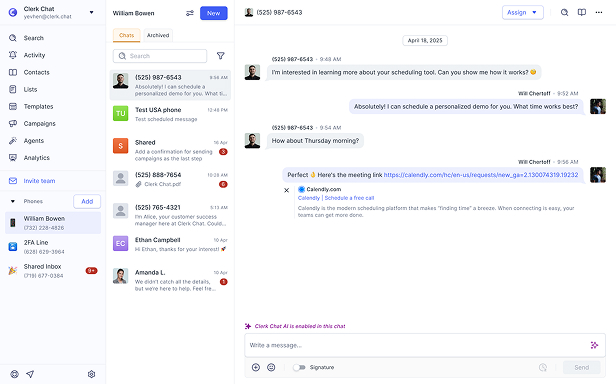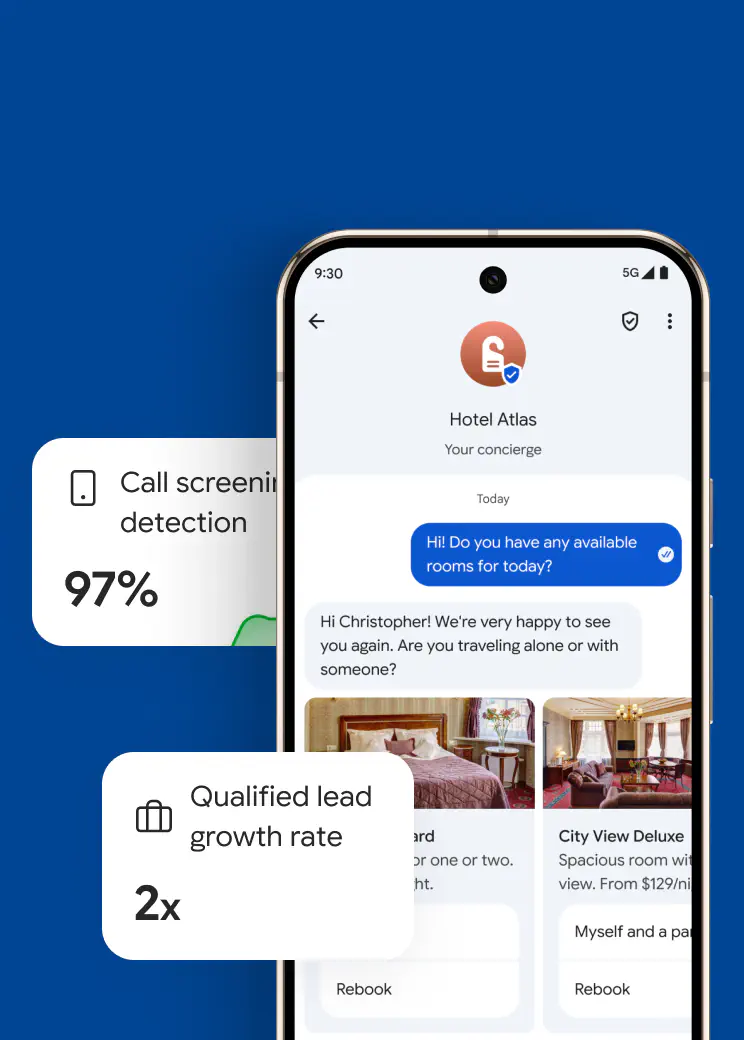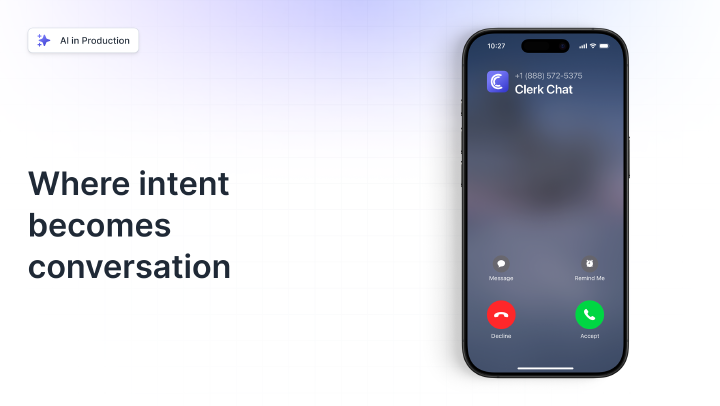Conversational AI for Restaurants is a Recipe for Success
By William Bowen
- Published: July 15, 2025
Key points in this article:
- Conversational AI for restaurants enhances customer experiences by powering hyper-personalization across channels, streamlining ordering processes, and transforming marketing strategies.
- Beyond customer service, AI tools for restaurants can help to enhance inventory management processes, reduce waste, improve operational efficiency, and cut costs.
- While restaurants still face challenges with AI adoption, the right strategy can help. Focus on researching security and privacy standards, maintaining compliance, choosing flexible, user-friendly technologies, and updating your models regularly.
- The future of AI in the restaurant industry is bright. New agentic AI innovations, biometric features, and advanced algorithms will continue to reshape the food service landscape.
The recipe for success is constantly changing for restaurants and food service businesses. These days, to increase profits, earn loyal customers, and boost operational efficiency, you need to invest in the latest tech strategies - from exploring SMS marketing for restaurants to innovating with artificial intelligence.
Conversational AI for restaurants, in particular, is gaining significant attention in the food service landscape. The right AI tools aren’t just helping organizations improve customer experiences. They’re also addressing numerous complex challenges - from rising labor costs to supply chain disruptions, and workflow inefficiencies.
Used correctly, conversational AI can help restaurants process orders more efficiently (even with limited staff), automate repetitive tasks, personalize diner experiences, and even develop more effective marketing campaigns.
So, how do you unlock the practical benefits of conversational AI in the restaurant industry? Here’s everything you need to know.
In this article:
What is Conversational AI in the Restaurant Industry?
Before we look at the benefits of conversational AI for restaurants and cafes, you might need help understanding conversational AI and how it differs from traditional chatbots.
Conversational AI is artificial intelligence that enables computers, machines, or software to communicate with human beings. Users can interact with “bots” through simple interfaces, using text or their voice. AI software (like Natural Language Processing algorithms) enables the systems to understand what those users are saying.
What makes conversational AI different from traditional chatbots is that these tools don’t just match words to scripts and respond with pre-set answers. They can discern the real meaning, context, and intent behind words.
Conversational AI for restaurants, therefore, gives companies access to virtual assistants that can interact more naturally with people throughout the consumer journey.
These bots can answer complex questions about table availability, meal ingredients, and booking policies, proactively recommend dishes to diners, and even assist restaurant employees with specific tasks, such as managing inventory and ordering supplies.
Missing out on late-night orders or busy-hour reservations because you can't respond 24/7? We get it.
Conversational AI for Restaurants: Top Use Cases
Conversational AI for hospitality companies, restaurants, and food service organizations is quickly becoming a hot topic. Like many firms investing in AI solutions, many brands are focusing initially on the benefits of conversational AI for customer service.
After all, AI tools that can genuinely understand and respond creatively to human input are far more effective at handling customer service tasks than old-fashioned chatbots.
However, the benefits of conversational AI for restaurants and cafes also extend further than you might think. Forward-thinking companies are beginning to use these tools for everything from marketing and engagement strategies to inventory and operations management.
Let’s take a closer look at some of the top use cases of conversational AI for restaurants.
AI-Powered Marketing and Customer Engagement
Want to take your restaurant marketing strategy to the next level? Conversational AI could be the answer. With its ability to analyze vast volumes of customer data, conversational AI enables companies to create personalized growth strategies at scale.
Innovative tools can help restaurants create targeted, promotional campaigns for specific customer segments, based on data about the dining preferences or communication styles of different audiences. Some solutions can even help companies develop effective marketing strategies for multiple channels.
For instance, restaurants could create bots that empower them to use conversational marketing techniques across websites, social media channels, and SMS.
With conversational AI for restaurants, companies can also:
- Automate omnichannel campaigns: Using AI, restaurants can create omnichannel marketing campaigns, scheduling messages to reach customers at specific points in their journey. A conversational SMS messaging bot could even gather data from a customer and use what it learns to personalize the experience dynamically.
- Manage reviews and online reputation: Conversational AI bots can constantly monitor positive and negative online reviews, providing insights into genuine customer sentiment and helping firms to address complaints promptly. These tools can even automatically request feedback from diners after a booking.
- Enhance loyalty programs: Conversational AI built into loyalty programs can help boost customer retention rates. Bots can send special offers to customers based on previous purchases, issue rewards, and even collect insights from regular diners.


Streamlining the Ordering and Service Experience with AI
As mentioned above, most companies today already know that using AI for customer service is a powerful strategy. With conversational AI for restaurants, brands can answer customer questions 24/7 (in any language, on multiple channels).
These tools can also significantly streamline the ordering or reservation experience for diners. Customers can use an AI bot to quickly and conveniently make a reservation, submit an order for delivery, or inquire about discounts or group bookings.
Fast food restaurants like Domino’s Pizza, McDonald’s, and Pizza Hut even allow users to place orders using text or voice, all without needing a human staff member.
Some restaurants are even taking advantage of AI tools combined with SMS and RCS systems, using text-to-pay features to allow diners to pay for orders before they arrive, or after they’re finished dining (reducing the work of in-house staff).
AI tools can also help reduce the risk of “no-shows” and empty restaurant tables. After a customer books a table, an AI-powered system can automatically send an SMS appointment reminder to that customer, letting them know when their table will be ready.
With RCS business messaging, some systems can even add extra elements to the message, such as a map to the restaurant’s location or a form to fill out about dietary requirements. This doesn’t just improve customer experiences, it reduces waste, increases revenue, and minimizes employee strain.
Personalizing the Dining Experience with AI
Another significant way to use conversational AI for restaurants is to leverage this technology to “personalize” the dining experience. We’ve already mentioned how companies can use AI to create personalized marketing messages for different audiences, or take advantage of bots to collect information about diner preferences.
Restaurants can also use AI to send special offers or SMS coupons to different customers, based on their proximity to specific restaurant locations or purchasing history.
Using AI for restaurants also enables companies to provide every diner with an expert they can rely on for meal or purchase recommendations. For instance, even before a customer arrives at a restaurant, they could message or text a bot, asking for advice on which meals to consider, based on their dietary restrictions, or the latest offers available.
Intelligent tools can learn about customer preferences over time, adapting their responses based on previous orders and purchases. For instance, IHOP’s chatbot uses machine learning to analyze a customer’s past orders and recommend dishes they might prefer.
The great thing about this approach to personalization in customer service is that it doesn’t just enhance the diner experience. It also gives companies a great chance to take advantage of upsell and cross-sell opportunities that could increase revenue.
Optimizing Inventory Management and Reducing Waste
As mentioned above, one of the most compelling use cases for conversational AI for restaurants actually has very little to do with customer service. Every year, restaurants and cafes in the United States waste around 33 billion pounds of food.
That’s not just a problem for food service companies from a sustainability perspective - it also leads to significant revenue and profit losses. That’s particularly true now that 97% of restaurants in the US are facing higher food costs than ever before.
AI tools can help mitigate some of this waste in several ways. First, intelligent tools can help restaurants analyze inventory and purchasing data to manage their supply of ingredients better and maintain optimal stock levels.
Some companies even use conversational AI tools to automate supplier communications, ensuring they don’t run out of crucial resources. Conversational AI tools can also suggest products to customers based on inventory levels.
For instance, a restaurant using conversational commerce strategies to send dish recommendations or special offers to customers across channels could infuse that tool with their inventory management systems.
Whenever a local customer asks for a dish recommendation, that bot can assess which dishes need to be sold quickly in specific locations, potentially enticing customers to choose those options with vouchers and discount codes.
Enhancing Staff, Table, and Business Management
Business management in the food services space introduces many complex challenges that conversational AI for restaurants could address.
Look at staff scheduling, for instance. The average restaurant faces higher staff turnover rates than most other organizations, making proper human resource management increasingly important. AI tools, particularly those with predictive capabilities, can be invaluable.
AI solutions can analyze historical data, anticipate periods of higher demand, and optimize staff schedules accordingly. Some systems can integrate with various business messaging and workflow management tools, keeping employees updated on staffing changes.
Companies like Chili’s Grill & Bar utilize AI to enhance staff scheduling and forecasting strategies across over 1,200 locations. With AI, this organization has reduced labor costs, minimized employee burnout, and improved customer satisfaction.
Beyond staff management, AI tools can help with table management too. Certain tools can track which tables are full, which are ready for new customers, and which are being cleaned.
Then, they can send mass texts from computer systems or messages to employees, guiding them on how to seat new visitors. This reduces wait times for customers and improves operational efficiency.
The Benefits of Conversational AI for Restaurants and Cafes
Overall, conversational AI for restaurants is helping companies become more efficient, customer-focused, and more profitable at scale. While the exact advantages you gain from implementing these technologies may vary, most companies can look forward to:
Improved Customer Experiences
Investing in AI tools to improve customer service and experiences is one of the best ways for restaurants to stay competitive in an evolving market.
Conversational AI in the restaurant industry enhances customer experiences through every stage of their journey with your organization. AI tools can suggest reservation slots, meals, and offers to customers based on their specific preferences and needs.
These solutions can answer customer questions and resolve issues 24/7, whether diners are concerned about allergens in dishes or trying to pay a reservation fee upfront. Plus, AI tools can streamline the diner experience when they visit your restaurant, helping to ensure customers get seated faster and receive the best level of care during their visit.
Enhanced Operational Efficiency
Behind the scenes, conversational AI for restaurants plays a crucial role in enhancing operations, improving accuracy, and minimizing waste. It can streamline conversational customer engagement tasks, like sending personalized messages and offers to diners.
AI tools can automate order processing tasks, as well as conversations with suppliers and logistics providers. You can even use artificial intelligence to enhance inventory management and combat the issue of food waste.
Plus, restaurants can use conversational AI to help them identify the best scheduling strategies for staff members and make the most of their existing resources.
Improving Growth with Data-Driven Insights
Another major benefit of conversational AI in the restaurant industry is that it gives companies access to huge volumes of valuable data. We’ve already mentioned how AI tools can reduce costs by helping to streamline staffing and scheduling strategies, as well as optimize inventory management processes.
However, conversational AI tools can also delve into various forms of data to inform intelligent growth strategies. For instance, with insights into previous conversations with customers, your AI tools could help you discover strategies to improve customer response times, or deliver more proactive service.
AI solutions can even examine sample text message marketing strategies for restaurants, as well as previous campaign results, to help businesses improve the ROI of their promotional efforts. AI tools can even guide business leaders on how to train and upskill their employees, with insights into individual performance metrics for each team.
Missing out on late-night orders or busy-hour reservations because you can't respond 24/7? We get it.
Conversational AI for Restaurants: The Challenges
While the benefits of conversational AI for restaurants and cafes are potentially huge, businesses still face challenges to overcome. First, many companies still struggle with the initial cost and complexity of implementing AI tools.
Even if you find a system that integrates seamlessly with your existing communication platforms, CRM systems, and other tools, you may need to train your team members on how to take full advantage of things like AI-powered SMS capabilities while avoiding risks.
Then, there are privacy, security, and compliance concerns to consider. To personalize customer experiences with AI, you need to grant your tools access to relevant data. But various compliance standards place strict restrictions on how companies should collect and use customer data, even for AI systems.
There are even compliance threats to consider when implementing certain types of marketing and customer service strategies. For instance, if you’re using AI to send marketing messages to customers, you’ll need to think about SMS compliance standards, like obtaining explicit consent to message contacts.
You may even need to consider 10DLC registration guidelines if you’re going to be using 10-digit code numbers for certain promotional message examples.
Our Top Tips for a Successful Implementation
The good news is that the challenges above aren’t insurmountable. All you really need is the right strategy. Before you begin investing in conversational AI for restaurants:
- Do your research: Learn about the compliance and security standards you’ll need to follow when using AI tools. Ensure your team members are aware of how to protect sensitive data and effectively leverage AI features.
- Choose the right Tech: Pick a conversational AI solution that offers comprehensive security features, an easy-to-use interface, and integrations with all of your existing tools, from your CRM system to your booking software.
- Invest in constant optimization: Gather insights from your software, as well as direct feedback from customers, to enhance your AI strategy over time. Regularly retrain and update your models.
Conversational AI for Restaurants: A Recipe for Success
The demand for conversational AI in the restaurant industry isn’t slowing down. In fact, the value of this technology is growing, as algorithms and tools continue to become more advanced. Increasingly, restaurant leaders are turning to conversational AI for customer service tasks, AI-driven sustainability initiatives, and marketing strategies.
Some companies are even beginning to embrace new modes of artificial intelligence, such as agentic AI solutions that can automate numerous repetitive processes efficiently, or multimodal systems that can easily comprehend visuals, voice, text, and more.
We’re even seeing some companies, like KFC, embedding biometric capabilities into AI tools, ensuring systems can immediately recognize diners when they arrive at a location, and personalize their experience accordingly.
The future of restaurants is intelligent, and now is the time for businesses of all sizes to start planning their own “recipe” for success.
Fortunately, Clerk Chat is here to help. Our comprehensive conversational messaging platform features built-in access to cutting-edge AI tools, designed to help restaurants refine their marketing, sales, and customer service strategies.
With Clerk Chat, you can discover endless ways to enhance customer experiences, improve operational efficiency, and boost retention rates, all on one user-friendly platform.
Embrace the era of AI and take your restaurant’s success to the next level.
Will’s latest superpower is building innovative AI solutions to add value for clients. He's passionate about all things AI, entrepreneurship, and enjoys staying active with sports and outdoor activities.
In this article:
Ready to use your business number for text messaging?
Thousands of businesses are already experiencing the power of conversational messaging through SMS. Join us. Free trial and paid tiers available.
Get Started#Subscribe
Get product updates in your inbox
Tutorials, features, and Clerk Chat news delivered straight to you.



